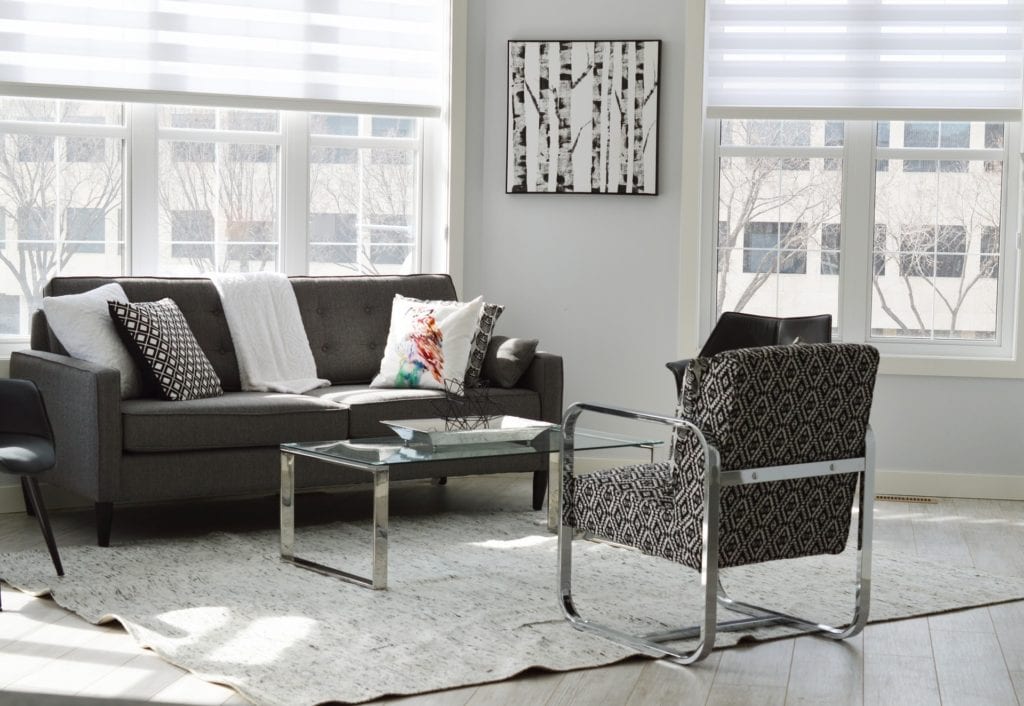Owning and living in a large home has its benefits and perks. Often people take a reactive approach to downsizing their home as a solution to changing circumstances. It can be wise to take a proactive approach to downsizing as preparing for the shift prevents making decisions soon after a life changing event which can cause stress or financial hardship. Whether you’re looking to reduce your expenses, prepare for a more comfortable lifestyle after retirement, free up cash to make dreams come true or reduce your carbon footprint, sacrificing some space may be the right decision for you.
If you think it may be time to downsize your home, try asking yourself these 8 questions:
1. What is your motivation for staying in a big home?
 If the space you live in is not being filled or used, it may be perception which causes you to feel you “need” a big house. Perceptions of wealth or success could be hindering your evolution to a better fitted home as larger homes can be a status symbol to some. Keeping a home that’s too big for your needs won’t necessarily benefit you in your later years so it’s important to differentiate between what you want people to think of you, and what’s good for you. Some may feel an emotional tie to a home after making years of memories with loved ones, but it’s important to remember that you will make new memories anywhere you call home and your memories from the past won’t disappear if you choose to move.
If the space you live in is not being filled or used, it may be perception which causes you to feel you “need” a big house. Perceptions of wealth or success could be hindering your evolution to a better fitted home as larger homes can be a status symbol to some. Keeping a home that’s too big for your needs won’t necessarily benefit you in your later years so it’s important to differentiate between what you want people to think of you, and what’s good for you. Some may feel an emotional tie to a home after making years of memories with loved ones, but it’s important to remember that you will make new memories anywhere you call home and your memories from the past won’t disappear if you choose to move.
2. Do you require more assistance with your day-to-day life?
The equity from your house can be a great contribution to acquiring the type of living environment or community that can improve your quality of life. Maybe you’d like to have all your rooms on one floor so you don’t have to take the stairs. Perhaps the daily upkeep of your home like cleaning and repairs are taking up too much of your time or are not as accessible to you anymore. That lawn you once loved might not be useful anymore and you’re paying someone to cut the grass every week. Some people may even find their health could benefit from more accessible exercise like a pool with group activities organized daily. If these ideas resonate with you, you may benefit from downsizing to a condo with minimal upkeep or a senior retirement community that offers an easier lifestyle.
3. Do you want to reduce your expenses?
 Have you been looking for a way to reduce your monthly expenses or save for the future? Reducing expenses is one of the primary reasons people make the choice to downsize their home. Whether it’s because you’ve been living beyond your means and want to make changes, you want to save for the future or something special, or you’d like to focus on paying off debt, downsizing properly can give you extra cash at the end of each month. Even if a home is paid off, a big home can eat up a lot of money in utilities, upkeep and property taxes. The aforementioned costs are especially significant when you’re already living on a fixed budget like during retirement. Your biggest investment (your home), may also carry quite a bit of equity which, if freed up by downsizing, could allow you to pay off debt.
Have you been looking for a way to reduce your monthly expenses or save for the future? Reducing expenses is one of the primary reasons people make the choice to downsize their home. Whether it’s because you’ve been living beyond your means and want to make changes, you want to save for the future or something special, or you’d like to focus on paying off debt, downsizing properly can give you extra cash at the end of each month. Even if a home is paid off, a big home can eat up a lot of money in utilities, upkeep and property taxes. The aforementioned costs are especially significant when you’re already living on a fixed budget like during retirement. Your biggest investment (your home), may also carry quite a bit of equity which, if freed up by downsizing, could allow you to pay off debt.
4. Does Your home have features that no longer suit your lifestyle?
A big home and property is a joy when it’s being used often and the upkeep is manageable. Big yards, pools and large basements can provide you and your family with functionality and fun, but once these spaces are not really used anymore, their maintenance can become a burden. High-maintenance landscaping and rooms can even take a physical toll on you as you age. It’s important to consider how important these spaces are to you and your family and if losing them may in fact be a blessing rather than a loss. A condo or a low-maintenance property can be a great solution for those who recognize their home has become too big for their lifestyle.
5. What dreams could you fulfill by downsizing?
 Often times we live in a house that fulfills our current needs and makes our lives easy. Shorter day-to-day commutes are facilitated by living close to our place of work and good school districts have our children’s best interests in mind. As our lives evolve, we can adjust and relocate to fulfil new needs or even dreams we’ve had for some time. Maybe you’ve always wanted to live in the hustle and bustle of downtown but you lived in the suburbs to give your children more time outside to play. Once children grow up and leave the nest, it’s possible to move into an apartment downtown. Perhaps you’ve always dreamt of having more money to travel each year or had your eye on a special cruise with your partner. Reevaluating your needs and downsizing can often free up finances to fulfill some of your dreams.
Often times we live in a house that fulfills our current needs and makes our lives easy. Shorter day-to-day commutes are facilitated by living close to our place of work and good school districts have our children’s best interests in mind. As our lives evolve, we can adjust and relocate to fulfil new needs or even dreams we’ve had for some time. Maybe you’ve always wanted to live in the hustle and bustle of downtown but you lived in the suburbs to give your children more time outside to play. Once children grow up and leave the nest, it’s possible to move into an apartment downtown. Perhaps you’ve always dreamt of having more money to travel each year or had your eye on a special cruise with your partner. Reevaluating your needs and downsizing can often free up finances to fulfill some of your dreams.
6. How much space and storage do you need?
Even the most organized home owners tend to accumulate more things the bigger their house is. A popular appeal to downsizing is purging unused items. Downsizing can be a great opportunity to get organized and rid yourself of clutter. Decluttering proactively is much more effective than taking care of extra things as a reaction to circumstances which force you to downsize. If you’re considering downsizing, take inventory of the things you want and need to keep in your home and make an educated decision about the square footage and floor plan that will suit you best. It’s important to make sure your new, smaller home has all the storage and space you need so that you don’t find yourself paying monthly for a storage unit. Once you start looking at everything in your home, you may be surprised what you’re happy to live without and may decide to donate what you don’t need anymore.
7. Does your home suit your lifestyle & needs?
 As we shift from one stage of life to the next, our lifestyle and needs change. When your home suits your needs best, you’ll be happier, more satisfied and will probably live within your means. Defining your lifestyle and needs is an important step in deciding to downsize your home. Whether you’re an empty nester and need less rooms now that your children have moved out or you’re looking to have all your rooms accessible on one level because the stairs are becoming more challenging, downsizing can be a great solution. Maybe you’re looking to reduce your carbon footprint and adjust your lifestyle in a smaller environmentally conscious home, or perhaps you’re looking to move to a community where you can interact with like-minded people.
As we shift from one stage of life to the next, our lifestyle and needs change. When your home suits your needs best, you’ll be happier, more satisfied and will probably live within your means. Defining your lifestyle and needs is an important step in deciding to downsize your home. Whether you’re an empty nester and need less rooms now that your children have moved out or you’re looking to have all your rooms accessible on one level because the stairs are becoming more challenging, downsizing can be a great solution. Maybe you’re looking to reduce your carbon footprint and adjust your lifestyle in a smaller environmentally conscious home, or perhaps you’re looking to move to a community where you can interact with like-minded people.
8. How will downsizing benefit your retirement?
Retirement often means living on a fixed income, so it’s important to look at how downsizing could affect your bank account each month during retirement. Downsizing is one of the steps you can take which can enhance your lifestyle during retirement and even during planning and leading up to retirement. Lowering your mortgage payments by opting for a smaller more suitable home for your needs can help you feel more comfortable on your fixed retirement income. Bringing down your other expenses such as property taxes, utilities and home repairs by living in a smaller space will also help you live more comfortable financially during retirement.
We recommend talking with a real estate agent who knows the ins and outs of downsizing and who can help you work through the finances and even the emotions of downsizing so you can make the best decision for you.
Did you like our Are You Ready to Downsize Your Home? Top 8 Questions to Ask Yourself When Considering Downsizing article? Check out our other resources here.
If you are seeking advice on selling a home in the Ottawa area, or have more questions for us, we are happy to provide you with helpful guidance and support. Email us at info@buyandsellottawa.ca or call us at 613-590-3036.
